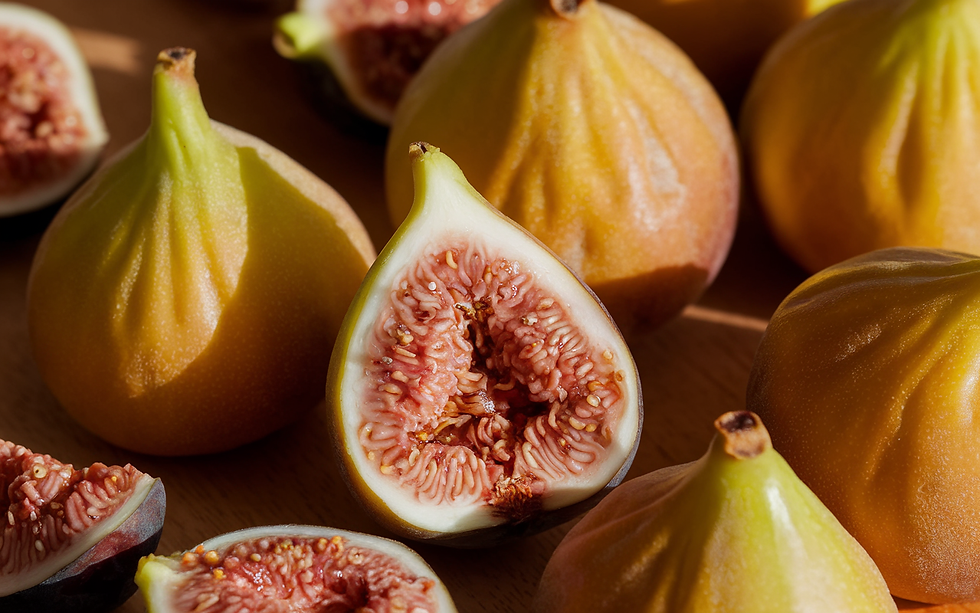Creative Ways to Use Dried Fig Leaf: Flavor, Wellness & Kitchen Inspiration
- Alla P.
- Aug 19, 2025
- 3 min read

There’s something quietly magical about fig leaves. The first time dried fig leaf tea warmed in the kitchen and filled the room with a gentle vanilla‑coconut scent, it felt like discovering a new layer in familiar flavors. Using dried organic fig leaf turns simple meals into thoughtful little rituals. Whether for flavor, wellness, or just creativity, fig leaves bring something special.
Why Choose Organic, Home‑Grown & Air‑Dried Fig Leaf
Home‑grown leaves mean no surprises—no unexpected sprays or pesticides.
Air‑drying helps preserve delicate aromas (vanilla, coconut, green walnut) that often fade with harsh heat.
Hand‑picked ensures leaves are young and tender—much better flavor / texture than older leaves.
Top Ways to Use Organic Dried Fig Leaf
Here are several favorite methods from experimenting in my kitchen and garden, all using dried fig leaf to add flavor and herbal touch.
1. Dried Fig Leaf Tea
Make a soothing fig leaf tea by steeping 1‑2 dried fig leaves in hot water. For a twist, add ginger, citrus peel, or a hint of mint. The flavor is mild, subtly sweet with coconut and green undertones. Great for evenings or when you want something calming.
Health benefits (supported by research) include possible blood sugar regulation, antioxidant effects, and support for skin health. PMC+1
2. Infusion Dried Fig Leaf into Cream or Milk for Desserts
Infuse dried fig leaf into cream or milk as the base for panna cotta, custard, or ice cream. Heat gently so it never boils; strain before using. The aroma it imparts transforms ordinary dessert into something layered and fragrant.

3. Flavoring Syrups & Sweeteners with Dried Fig Leaf
Combine dried fig leaf with sugar, honey, or simple syrup to make a fig‑leaf syrup. Use it on pancakes, in teas or cocktails, or drizzle over yogurt/granola. Toasting the dried leaf beforehand enhances flavor.
4. Cooking Wraps and Aromatic Steam with Dried Fig Leaf
Use whole dried fig leaves (rehydrated or softened) to wrap fish, cheese, or vegan proteins. Cooking inside the wrap steams the food gently and transfers delicate fig leaf aroma. Also works to simmer rice with one fig leaf in the pot for subtler fragrance.
5. Powdered Dried Fig Leaf for Spice Blends or Rubs
Grind up dried fig leaf into a fine powder. Use sparingly in spice blends, rubs, or dessert decorations. It can take the place of vanilla bean notes, or add herbal depth in chocolate or nut dishes.
Dried Fig Leaf Health & Safety Notes
Always wash leaves well before using. Even dried, dust or stray particles may linger.
If you have allergic sensitivities (to figs, latex, etc.), test a small amount first.
Use leaves in culinary quantity; avoid overconsumption of medicinal doses unless guided by professional sources.
Dried Fig Leaf Tips from the Garden & Kitchen
Store dried fig leaf in an airtight, dark container. Light and moisture degrade flavor fast.
When trying new infusions or recipes, less is more: one leaf in a pot of liquid vs two often yields a better flavor balance.
Recipes to Try with Dried Fig Leaf
Fig Leaf & Coconut Rice (simmer rice with a dried leaf and coconut milk)
Fig Leaf Panna Cotta with honey glaze
Simple herbal fig leaf syrup for tea / desserts
Cheese or goat cheese wrapped in dried fig leaf, chilled before serving
If you’re looking for premium fig leaves to try these ideas, Organic Fig Leaf Dried, Home‑grown, Hand‑Picked, Air‑Dried offers all the qualities you want: clean, natural flavor, reliably tender, and ready to use in both savory and sweet preparations. It’s ideal for tea lovers, home cooks, kitchen experimenters, or anyone wanting to add that extra layer of aroma and wellness from something truly natural.
Fig leaves are more than garden adornments, they’re bridges between kitchen, health & scent. With a little creativity, the dried fig leaf becomes a tool: tea base, flavor infusion, wrap, garnish or even spice powder. Starting with organic, hand‑picked, air‑dried leaf ensures you're getting the best profile possible. Try one of the ideas above—and you’ll often find it becomes a regular flavor memory in your cooking.


























Comments